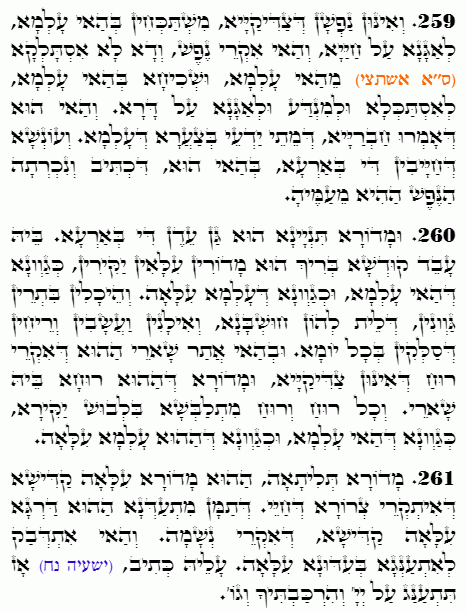Daily Zohar # 4663 – Acharei Mot – High hills of the earth
Daily Zohar 4663

Hebrew translation:
260. וְהַמָּדוֹר הַשֵּׁנִי הוּא גַּן הָעֵדֶן שֶׁבָּאָרֶץ, בּוֹ עָשָׂה הַקָּדוֹשׁ בָּרוּךְ הוּא מְדוֹרִים עֶלְיוֹנִים נִכְבָּדִים, כְּמוֹ שֶׁהָעוֹלָם הַזֶּה וּכְמוֹ שֶׁהָעוֹלָם הָעֶלְיוֹן, וְהֵיכָלוֹת בִּשְׁנֵי גְוָנִים שֶׁאֵין לָהֶם חֶשְׁבּוֹן, וְאִילָנוֹת וַעֲשָׂבִים וְרֵיחוֹת שֶׁעוֹלִים בְּכָל יוֹם. וּבַמָּקוֹם הַזֶּה שׁוֹרֶה אוֹתוֹ שֶׁנִּקְרֵאת הָרוּחַ שֶׁל אוֹתָם הַצַּדִּיקִים, וְהַמָּדוֹר שֶׁל אוֹתָהּ רוּחַ שֶׁבּוֹ שׁוֹרָה, וְכָל רוּחַ וְרוּחַ מִתְלַבֶּשֶׁת בִּלְבוּשׁ נִכְבָּד כְּמוֹ שֶׁל הָעוֹלָם הַזֶּה, וּכְמוֹ שֶׁל אוֹתוֹ עוֹלָם עֶלְיוֹן.
261. הַמָּדוֹר הַשְּׁלִישִׁי, אוֹתוֹ מָדוֹר קָדוֹשׁ עֶלְיוֹן שֶׁנִּקְרָא צְרוֹר הַחַיִּים, שֶׁשָּׁם מִתְעַדֶּנֶת אוֹתָהּ דַּרְגָּה עֶלְיוֹנָה קְדוֹשָׁה שֶׁנִּקְרֵאת נְשָׁמָה, וְזוֹ דְּבֵקָה לְהִתְעַנֵּג בָּעֹנֶג הָעֶלְיוֹן. עָלֶיהָ כָּתוּב, (ישעיה נח) אָז תִּתְעַנַּג עַל ה’ וְהִרְכַּבְתִּיךָ וְגוֹ’.
.
Zohar Acharei Mot
Continued from previous DZ
#259
The souls of the Tzadikim are present in this world to protect the living. Their soul level of Nefesh does not depart from this world but remains here to observe, to know, and to protect the generation. This is what the friends said: that the dead are aware of the world’s suffering, and the punishment of the wicked on earth is through the level of Nefesh, as it is written: ‘וְנִכְרְתָה הַנֶּפֶשׁ הַהִוא מֵעַמֶּיהָ’ ‘And that soul (Nefesh) shall be cut off from its people.’ (Leviticus 7:27).
Notes:
The Zohar highlights the enduring influence of the Tzadikim after death. Their Nefesh remains in the world to safeguard the living and maintain a connection between the physical and spiritual realms. This passage also implies that while the Tzadikim continue to protect and support the world, the wicked, through their actions, sever themselves from this protective presence, leading to their punishment.
#260
The second section is the earthly Garden of Eden. In it, the Holy One, blessed be He, made exalted and precious dwellings similar to this world and the upper world. That is to say, they encompass aspects of Malchut and aspects of Binah. For “גַּן” “Garden” is the secret of Malchut, and “עֵדֶן” “Eden” is the secret of Binah. The palaces above are also in two aspects, like the dwellings, and they are without count. Trees, plants, and fragrances ascend there every day. In that place resides what is called the Ruach of the Tzadikim, and it is the place where Ruach dwells. Every Ruach is clothed in a precious garment resembling both this world and the upper world.
#261
The third section is the holy upper realm called ‘צְרוֹר הַחַיִּים’ ‘The Bundle of Life,’ which is the upper Garden of Eden. There, the holy level of the soul called Neshamah delights and cleaves to enjoy the supernal Eden. Concerning this, it is written:
Isaiah 58:14
“אָז תִּתְעַנַּג עַל יְהוָה וְהִרְכַּבְתִּיךָ עַל בָּמֳתֵי אָרֶץ וְהַאֲכַלְתִּיךָ נַחֲלַת יַעֲקֹב אָבִיךָ כִּי פִּי יְהוָה דִּבֵּר.”
“Then you shall delight yourself in YHVH, And I will cause you to ride on the high hills of the earth, And feed you with the heritage of Jacob, your father. The mouth of YHVH has spoken.”
The upper Garden of Eden is called the “high hills of the earth.”
Notes:
The Zohar emphasizes the ultimate reward and spiritual elevation of the Tzadikim. After progressing through the first two sections corresponding to the Nefesh and Ruach, the righteous soul level of Neshamah reaches the upper Garden of Eden or the Bundle of Life. Here, the soul enjoys unparalleled closeness to Hashem, delighting in the Divine Presence. This state is characterized by eternal joy, fulfillment, and the culmination of the soul’s journey toward unity with Hashem. The use of the verse from Isaiah underscores the promise of this profound spiritual delight for those who have devoted themselves to a life of righteousness.
{||}

 Previous: Acharei Mot
Previous: Acharei Mot

